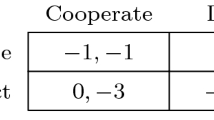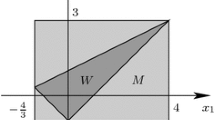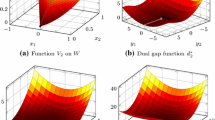Abstract
A generalised Nash game is a non-cooperative game in which each player is facing an optimisation problem where both the objective function and the feasible set depend on the variables of the other players. A classical way to treat numerically this difficult problem is to solve the nonlinear system composed of the concatenation of the Karush–Kuhn–Tucker optimality conditions of each player’s problem. The aim of this work is to provide constraint qualification conditions ensuring that both problems share the same set of solutions. Our main target here is to elaborate tractable conditions, that is, sets of conditions that are as simple as possible to fulfil. This is achieved through the analysis of “minimal” qualification conditions for parametric optimisation problems.



Similar content being viewed by others
Notes
This concept is not the joint convexity of a game as defined by Rosen. In general, they are not comparable, but our assumption is stronger when all players have the same constraint, i.e. \(g_j=g\), for all \(j\in J\).
References
Aussel, D., Svensson, A.: Some remarks about existence of equilibria, and the validity of the epcc-reformulation for multi-leader-follower games. J. Nonlinear Convex Anal. 19(7), 1141–1162 (2018)
Arrow, K.J., Debreu, G.: Existence of an equilibrium for a competitive economy. Econometrica: J. Econometric Soc. 22(3), 265–290 (1954)
Facchinei, F., Kanzow, C.: Generalized nash equilibrium problems. 4OR 5(3), 173–210 (2007)
Fischer, A., Herrich, M., Schönefeld, K.: Generalized nash equilibrium problems-recent advances and challenges. Pesquisa Oper. 34(3), 521–558 (2014)
Stein, O., Sudermann-Merx, N.: The noncooperative transportation problem and linear generalized nash games. Eur. J. Oper. Res. 266(2), 543–553 (2018)
Dreves, A., Gerdts, M.: A generalized nash equilibrium approach for optimal control problems of autonomous cars. Optim. Control Appl. Methods 39(1), 326–342 (2018)
Sudermann-Merx, N.G.: Linear generalized nash equilibrium problems. Ph.D. thesis, Karlsruher Instituts fur Technologie (2016)
Dreves, A.: Computing all solutions of linear generalized nash equilibrium problems. Math. Methods Oper. Res. 85(2), 207–221 (2017)
Rosen, J.B.: Existence and uniqueness of equilibrium points for concave n-person games. Econometrica 33(3), 520–534 (1965)
Aussel, D., Dutta, J.: Generalized nash equilibrium problem, variational inequality and quasiconvexity. Oper. Res. Lett. 36(4), 461–464 (2008). (Addendum: Oper. Res. Lett. 42 (2014), 398)
Kanzow, C.: On the multiplier-penalty-approach for quasi-variational inequalities. Math. Program. 160(1–2), 33–63 (2016)
Bueno, L., Haeser, G., Rojas, F.: Optimality conditions and constraint qualifications for generalized nash equilibrium problems and their practical implications. SIAM J. Optim. pp. 31–54 (2019). https://doi.org/10.1137/17M1162524
Kanzow, C., Steck, D.: Augmented lagrangian methods for the solution of generalized nash equilibrium problems. SIAM J. Optim. 26(4), 2034–2058 (2016)
Birgin, E.G., Haeser, G., Ramos, A.: Augmented lagrangians with constrained subproblems and convergence to second-order stationary points. Comput. Optim. Appl. 69(1), 51–75 (2018)
Gould, F., Tolle, J.W.: A necessary and sufficient qualification for constrained optimization. SIAM J. Appl. Math. 20(2), 164–172 (1971)
Acknowledgements
This research benefited from the support of the FMJH Program Gaspard Monge in optimisation and operation research, and from the support to this program from EDF. The second author was also benefited by a grant CONICYT-PFCHA/Doctorado Nacional/2018 N21180645.
Author information
Authors and Affiliations
Corresponding author
Additional information
Publisher's Note
Springer Nature remains neutral with regard to jurisdictional claims in published maps and institutional affiliations.
Rights and permissions
About this article
Cite this article
Aussel, D., Svensson, A. Towards Tractable Constraint Qualifications for Parametric Optimisation Problems and Applications to Generalised Nash Games. J Optim Theory Appl 182, 404–416 (2019). https://doi.org/10.1007/s10957-019-01529-4
Received:
Accepted:
Published:
Issue Date:
DOI: https://doi.org/10.1007/s10957-019-01529-4




